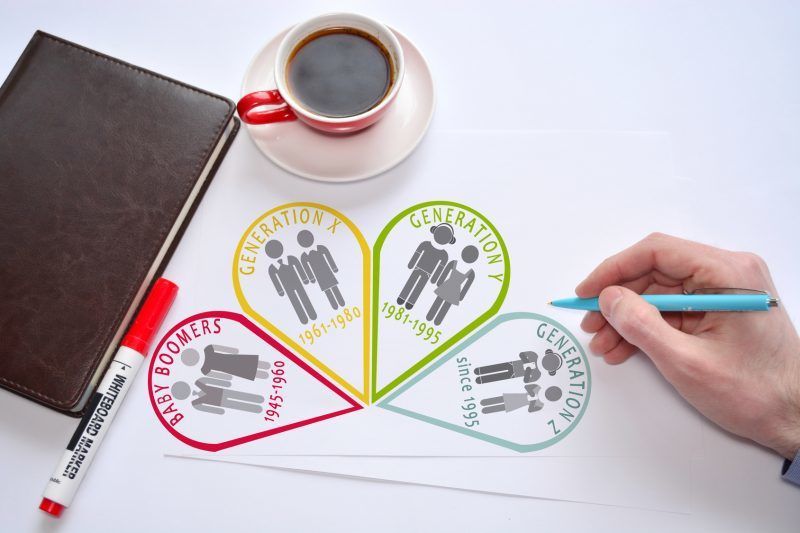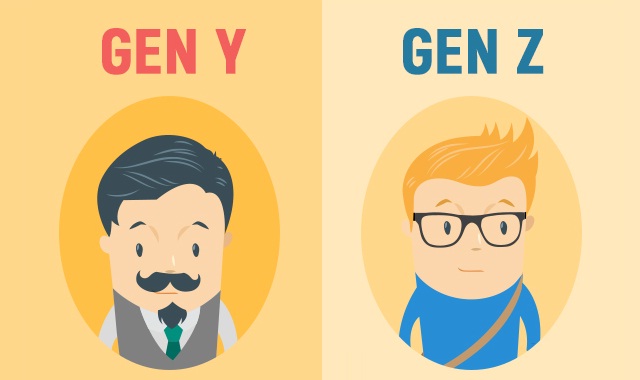What is meant by “generations”?
Individual generations differ from one another in terms of their characteristics. New generations such as generations Y and Z deliberately or unconsciously separate themselves from existing generations. Generations can, for example, be shaped by drastic experiences such as wars, but also serious technical changes, which have a lasting impact on the population in their daily activities.
Five generations have been classified from those born in 1922 to the present day. Even if this blog is mainly about the two youngest generations (Y and Z), all generations are briefly presented below.
From traditionalists to Generation Z
The traditionalists were born between 1922 and 1955. You saw the end of the First World War as well as the Second World War in your childhood and youth. The baby boomers were born between 1955 and 1969 and were the first post-war generation after World War II. You experienced the economic miracle and belong to the year with the highest birth rates. Generation X, born between 1965 and 1980, was strongly influenced in their childhood by the economic crisis and the rising divorce rate. Generation Y, born between 1980 and 2000, also known as Gen Y or Millennials, are those born at the turn of the century who have experienced the Internet boom and globalization to the full. They are characterized by a high level of education. Generation Z, born between 1995 and 2010, is also called Generation YouTube and has completely integrated the digitization of everyday life into their lives.

Characteristics of Generation Y (born between 1980 and 2000)
Generation Y is currently entering the labor market and, in contrast to previous generations, has very special demands on companies. Your own work must be meaningful, fun, and offer a high degree of variety. The generation also attaches great importance to self-fulfillment, is willing to learn and willing to work as well as flexible and adaptable. Members of this generation are team players who are characterized by excellent networking in the virtual world as well as offline. Generation Y grew up with new technologies and is therefore very familiar with Web 2.0. She likes to work independently and independently. Furthermore, this generation attaches great importance to freedom for private life. For this generation, there should be the opportunity to be able to regulate private matters during working hours. At the same time, however, you are also willing to work in your free time if necessary.
Features of Generation Z (born between 1995 and 2010)
In contrast to Generation Y, Generation Z has not yet entered the labor market. It is all the more important that employers think about how they can apply for employees of this generation in the future. In times of a shortage of applicants and the “impending” digitalization, Generation Z may be able to choose their employer of choice. Generation Z grew up completely with digital technologies and, unlike Generation Y, knows nothing more than a life with smartphones, tablets, and fast internet. More than Generation Y, this generation would again like to strictly separate private and professional life. The laptop is not taken home because a fixed demarcation is wanted. Self-realization is no longer only sought in work, but above all in leisure time and in social contacts. Social contact takes place just as virtually as in the real world. Generation Z has a great desire to develop freely because they can try their hand at unrestrained in all directions. However, the generation is also aware of its own uncertain future, as it will not achieve the prosperity of the parents’ generation. Further, clear characteristics cannot be derived at the moment, as this generation has only slowly entered the labor market.
What employers should consider
In recent years, the world of work has started to change fundamentally. This development will be even more noticeable in the next few years. Digitization and globalization are advancing faster and faster. The baby boomers and Generation X (now 50 to 65 years old) are gradually stopping to work. The following generations Y and Z have lower birth rates and will not be able to fill this gap. It is not without reason that one hears again and again that apprenticeships remain vacant. Human resources will therefore become an increasingly scarce resource. Employees belonging to the younger generations will be able to choose between several employers in the future. It is important for companies to position themselves as quickly as possible so that they can present themselves to both generations as an attractive employer.

Generations Y and Z work differently
It is estimated that there are currently eight million members of Generation Y on the labor market and three million of Generation Z. Both generations want co-determination and personal participation to be able to develop. Otherwise, they differ from each other as described above. While Generation Y would rather have flexible working hours, home office, and an optimal work-job blending (merging of professional and private life), Generation Z attaches importance to a clear separation of professional and private life and wants clearly defined structures on the job.
Diversity: Generations can learn from each other
The fact that the different younger generations with their different values and attitudes regarding their life and work meet each other and other, older generations in everyday working life can be a challenge for companies, but also a valuable opportunity. Companies should develop measures so that all generations can work well together. Diversity is a success factor because differences are used to the benefit of the company instead of striving for standardization. Everyone can learn from everyone. Above all, the younger generations can draw on the experiences of the older generations and learn from them, while the younger generations may be able to better explain the frenzied changing technology to the older ones.
In corporate communication for recruiting new employees, the wishes of potential employees should be addressed in a targeted manner. Depending on which generation is to be reached, different advantages of the employer may have to be mentioned. Target group-oriented marketing measures will prove to be useful.


